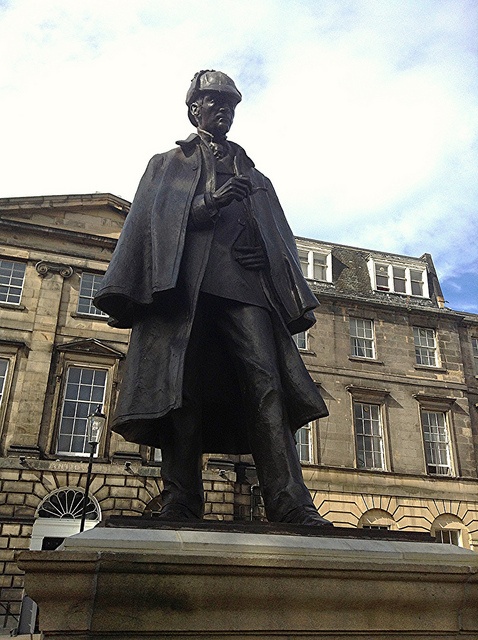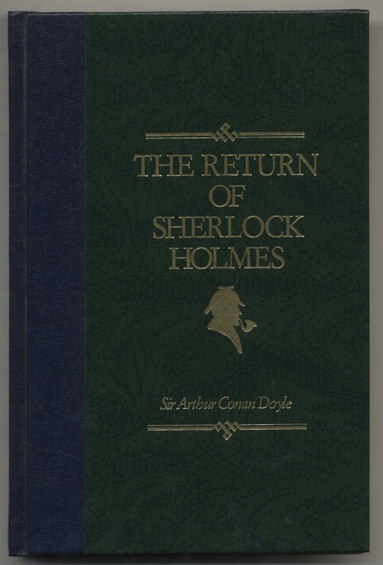As far as popular entertainment goes, we modern folk can have rather nineteenth century tastes. Our love of vampires can be traced to the vision of Bram Stoker. Our Christmas traditions are heavily indebted to the stories of Charles Dickens. Sherlock Holmes—kept alive by a menagerie of TV shows, films, memorabilia, and readers—is no different. But what is it about Sir Arthur Conan Doyle’s famous character that endures so well?
 In recent years, we’ve seen the television drama House (starring Hugh Laurie), as well as the BBC show Sherlock, bring Sherlock Holmes to life for a contemporary audience. Sherlock, which premiered in 2010, rips the characters from Conan Doyle’s pages—Sherlock, Dr. Watson, the villainous Moriarty—and transplants them to today’s London. The suspense is enhanced by modern possibilities—text messages from the enemy, bombs in the metro, analysis in the laboratory—but the core appeal remains much the same.
In recent years, we’ve seen the television drama House (starring Hugh Laurie), as well as the BBC show Sherlock, bring Sherlock Holmes to life for a contemporary audience. Sherlock, which premiered in 2010, rips the characters from Conan Doyle’s pages—Sherlock, Dr. Watson, the villainous Moriarty—and transplants them to today’s London. The suspense is enhanced by modern possibilities—text messages from the enemy, bombs in the metro, analysis in the laboratory—but the core appeal remains much the same.
It is no secret we come to the stories and character of Sherlock Holmes in part for mystery and excitement. The forensic crime drama, one of TV’s most popular and lucrative genres, owes much to Sherlock Holmes for forming its audience. But Sir Arthur Conan Doyle's Sherlock stories endure, especially for us today, for their treatment of friendship, work, and loneliness.
Sherlock Holmes is a master of deduction and observation, and in the contemporary mind, he is a kind of savant. When Sherlock is working on a case, he is completely invested in it, immune to distraction until he solves the puzzle. Sherlock gets to the bottom of things, to the truth concealed by mountains of trifles, legerdemain, and deception. The problem, of course, is that it isn’t so clear just when his job is done. Everything in this world is a puzzle. All around us has a hidden meaning and is shrouded in secrecy, and one who looks for secrets never rests.
Sherlock, portrayed by Benedict Cumberbatch, is not dissimilar from the type of Silicon Valley wiz we see portrayed in movies today. His work consumes him, and his talents come at the expense of his social skills. He lives so much within the rational, logical, and analytic mind that other sensitivities—more human ones—necessarily suffer. One recalls a scene from Sherlock where the detective points out that a doctor, who has a crush on him, had just applied lipstick. One cringes for the poor woman, her romantic gesture and hope shattered, while Sherlock does not detect he’s done anything wrong. He found the truth, he said the unsaid, and has done his job.
 The character of Sherlock Holmes remains a contemporary obsession because he reflects our anxieties about life and work. We have a particular idolization for those whose lives suffer for the sake of their vocation. One thinks of the computer genius or the Steve Jobs-like super-manager, who is not afraid of breaching niceties or being unpopular to get the best possible job done. We also think of the tortured artists—the David Foster Wallaces and Van Goghs of the world—who for their unique vision are punished by despair and isolation. The powers of perception and detection that make Sherlock a great mind and crime-solver, are the very same powers that alienate others and make all things calculable and rather devoid of magic.
The character of Sherlock Holmes remains a contemporary obsession because he reflects our anxieties about life and work. We have a particular idolization for those whose lives suffer for the sake of their vocation. One thinks of the computer genius or the Steve Jobs-like super-manager, who is not afraid of breaching niceties or being unpopular to get the best possible job done. We also think of the tortured artists—the David Foster Wallaces and Van Goghs of the world—who for their unique vision are punished by despair and isolation. The powers of perception and detection that make Sherlock a great mind and crime-solver, are the very same powers that alienate others and make all things calculable and rather devoid of magic.
Sherlock Holmes forces us to ask some rather prickly questions. What if the qualities that make us good at our jobs have a harmful effect on our personal life? Sherlock can solve any crime, but he pays the price in denying his friends their privacy—brilliance in one sphere, tactlessness in another. And this kind of conundrum applies to practically all lines of work. In the end, there is little fun in going on a date with a philosopher only capable of ponderous thought. Nor is there much pleasure in befriending a football player who dances after each victory in an argument. The impulses that make our work great have to be toned down for a proper life. The work-life balance, as we see through Sherlock, is not so much a matter of time, but one of character. And the balancing act involved takes a lifetime to perfect.
It is Sherlock Holmes’ understanding of relationships—more than its mystery and suspense—that makes the stories so durable. The friendship between Holmes and Dr. Watson is one of the finest examples of male friendship in literature, standing among the ranks of Don Quixote and Sancho Panza.
 What makes their friendship even more persuasive is how they work around each other’s differences. Watson must often search for the human core beneath Sherlock’s analysis and laconic emotion. And Sherlock must accept Watson’s own bourgeoisie concerns, like those of wife and family, which are rather absurd to him. Yet these obstacles and differences elevate rather than detract from their relationship. What they are willing to tolerate in each other is as revelatory as what they come to appreciate, a fact that all close friends eventually come to.
What makes their friendship even more persuasive is how they work around each other’s differences. Watson must often search for the human core beneath Sherlock’s analysis and laconic emotion. And Sherlock must accept Watson’s own bourgeoisie concerns, like those of wife and family, which are rather absurd to him. Yet these obstacles and differences elevate rather than detract from their relationship. What they are willing to tolerate in each other is as revelatory as what they come to appreciate, a fact that all close friends eventually come to.
The subtleties of Sherlock Holmes are never ending, and we are drawn to them as intensely as its hero is drawn to a murder scene. How do we keep our work from interfering with our lives? Do we really want to know everyone's secrets? In what ways do we fail our friends? These questions are embedded in the stories of Sherlock as much as they are in the chief concerns of the everyday. We are all detectives here. For in the end, we like a Sherlock Holmes story for the same reasons we keep up with life—we are intrigued by its endless mystery, and we are never done discovering.









